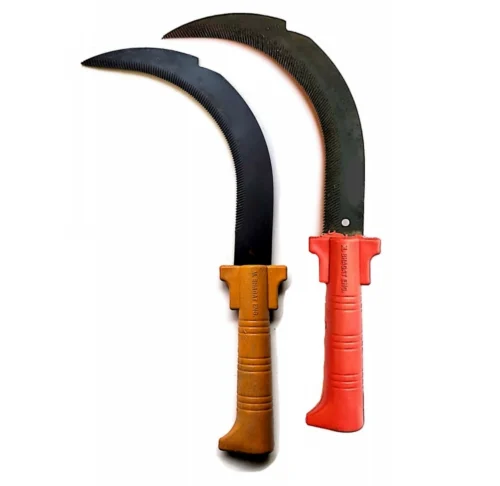11.5inch PVC Handle Garden Sickles
₹21.0
| Usage/Application | Agriculture |
| Blade Material | Carbon Steel |
| Material | PVC (Handle) |
| Size | 11.5 Inch ( Length ) |
| Model Name/Number | 1 |
| Brand | MBE |
| Blade Thickness | 1.6 mm |
- Description
- Additional information
- Reviews (0)
- Q & A
- Sustainability Remark
- More Offers
- Store Policies
- Inquiries
We V.V Manufacturer based in Rajkot Gujarat are Leading Manufacturer & Supplier of PVC / Plastic Agriculture Hand Sickel & Wooden Agriculture Hand Sickle and We can Supply All Over in India.
| brands | MBE |
|---|
You must be logged in to post a review.
Q & A
Harvest management tools, when properly implemented and utilized, can contribute to the sustainability of farming practices. These tools aid farmers in optimizing their harvest operations, reducing waste, and improving overall efficiency. Here are some ways in which harvest management tools promote sustainability:
Reduced food waste: Harvest management tools help farmers determine the optimal time for harvest based on crop maturity, quality, and market demand. By harvesting crops at the right time, farmers can minimize losses due to overripe or spoiled produce, reducing food waste and maximizing the utilization of resources.
Efficient resource allocation: These tools enable farmers to plan and allocate resources such as labor, equipment, and storage facilities effectively. By optimizing resource utilization during harvest operations, farmers can minimize unnecessary energy consumption, reduce costs, and decrease their environmental footprint.
Quality control: Harvest management tools allow for precise monitoring and control of harvesting parameters, such as temperature, humidity, and handling conditions. This ensures that crops are harvested under optimal conditions, preserving their quality and minimizing post-harvest losses.
Traceability and transparency: Some harvest management tools incorporate tracking and data recording functionalities, enabling farmers to maintain accurate records of the harvest process. This traceability promotes transparency and accountability throughout the supply chain, ensuring that farming practices align with sustainability standards and enabling better identification and resolution of any issues that may arise.
Data-driven decision making: Harvest management tools provide valuable data and insights that empower farmers to make informed decisions regarding harvest timing, storage, transportation, and market planning. By leveraging data-driven approaches, farmers can optimize their operations, minimize waste, and improve overall efficiency.
Crop rotation and soil health: Harvest management tools can assist farmers in implementing effective crop rotation strategies. By tracking and documenting the harvested crops, farmers can plan the rotation of different crops to optimize soil health, reduce pest and disease pressures, and enhance long-term sustainability.
To ensure the sustainability of harvest management tools, it's essential to consider factors such as the reliability and accuracy of the tools, their integration with other farm management systems, and ongoing training and support for farmers to effectively use and maintain the tools. Additionally, the adoption of these tools should be accompanied by sustainable practices throughout the entire farming process, including planting, cultivation, and post-harvest handling.
General Inquiries
There are no inquiries yet.



















Reviews
There are no reviews yet.